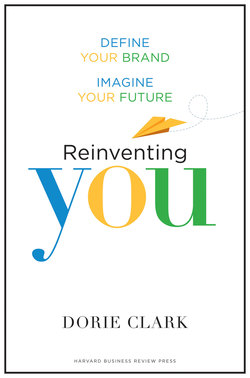Читать книгу Reinventing You - Dorie Clark - Страница 9
На сайте Литреса книга снята с продажи.
My Own Reinvention
ОглавлениеI became fascinated with the topic of reinvention because I’ve done quite a bit of it myself. These days, I consult on strategy and marketing for clients like Google, Yale University, and the National Park Service. But my first brush with professional reinvention came shortly after graduate school, when I was working as a rookie political reporter at a weekly newspaper. It was a Monday afternoon; someone told me I should stop by the HR office before heading home that night. I figured there was an adjustment to our health insurance policy or I needed to fill out some forms. Instead, after less than a year on the job, I was laid off. As my colleagues were streaming out for the night, I had to pack up my desk and close out my online accounts; there was no chance to say goodbye.
The next morning, glancing at CNN over breakfast, I watched the planes hit the World Trade Center. I lost my reporting job on September 10, 2001, and—as the geopolitical order spun out of control and the economy collapsed—I had to figure out how to make a living, and what was next.
Over time, despite the fear and paralysis in the marketplace, I built up a stream of business as a freelance journalist. But the money wasn’t great, and I was still hoping that I’d eventually be hired by the daily paper in my city. But it was under a hiring freeze, subject to the same internet-driven contraction as everyone else in the industry. For months, I plowed on, still imagining a future in journalism. So when I received an offer to “switch sides” and become the press secretary for Robert Reich, the former US Labor Secretary who was then a gubernatorial candidate, I initially said no. But an hour later, I called back; that’s perhaps where my reinvention process began.
If the world hadn’t intervened, I might still be a reporter; I love writing, meeting new people, and breathing the oxygen of interesting ideas. But the world is moving faster than ever, industries change, companies collapse, and sometimes our plans simply don’t work out. I also would have loved to run the White House press office, but that dream died around the time the presidential candidate I later worked for lost in the primaries. To survive and thrive, you have to reinvent yourself and move on.
And sometimes, of course, your reinvention is by choice: a creative embrace of a new direction. For a couple of years, I ran a nonprofit advocacy group and could have done so for several more. Instead, I decided to become an entrepreneur and launch my consulting business, a move that’s allowed me to travel the globe, consult for leading companies, and earn a great and fulfilling living.
It’s easy for me to see the connections and commonalities in retrospect: how my time as a journalist enabled me to be a better spinmeister when I started working for candidates, or how running a nonprofit gave me the broad-based business skills, from IT to finance, that I needed to become a consultant. But I also know those transitions might seem random to other people (and that’s not even mentioning my time as a documentary filmmaker or Harvard theology student). For years after I started my consulting business, people would still ask about campaigns I was working on, or how my advocacy work was going. Hadn’t they gotten the e-newsletters announcing my new venture? Or visited my new website? Were they just not paying attention?
But, of course, like most people, they weren’t. The truth is, the vast majority of people aren’t focused on you (or me) very much. That means their perceptions are probably a few years out of date, and it’s not their fault. With hundreds, or even thousands, of Facebook friends and vague social connections, we can’t expect everyone to remember all the details of our lives. That’s why it’s so essential that we take charge of our own reinvention and ensure our personal brands reflect, to the outside world, the reality of our lives.
As a consultant who specializes in marketing and branding, once I launched my business, it was essential for me—very quickly—to practice what I preached. I had to make sure my contacts understood exactly what skills I had and what services I offered, and to demonstrate sufficient expertise that, when the right moment came, I’d be the consultant they turned to. So I honed my narrative (what am I bringing to the table?), crafted my content (so clients could get a taste of my ideas and approach), and began using every vehicle possible—from speaking to writing to enlisting “validators”—to spread the message.
That’s the same process any professional goes through when reinventing herself. As I’ve built my consulting business, crafting marketing strategies for corporations, executives who learned about my background would often approach me. Could I help with their reinvention? Where should they start? What if they weren’t sure about their destination? And how could they begin to overturn the entrenched perceptions others held about them? Over the years, I’ve had the pleasure of advising scores of executives looking for new directions. This book is the product of those conversations. I hope it proves useful as you consider your next professional iteration.
